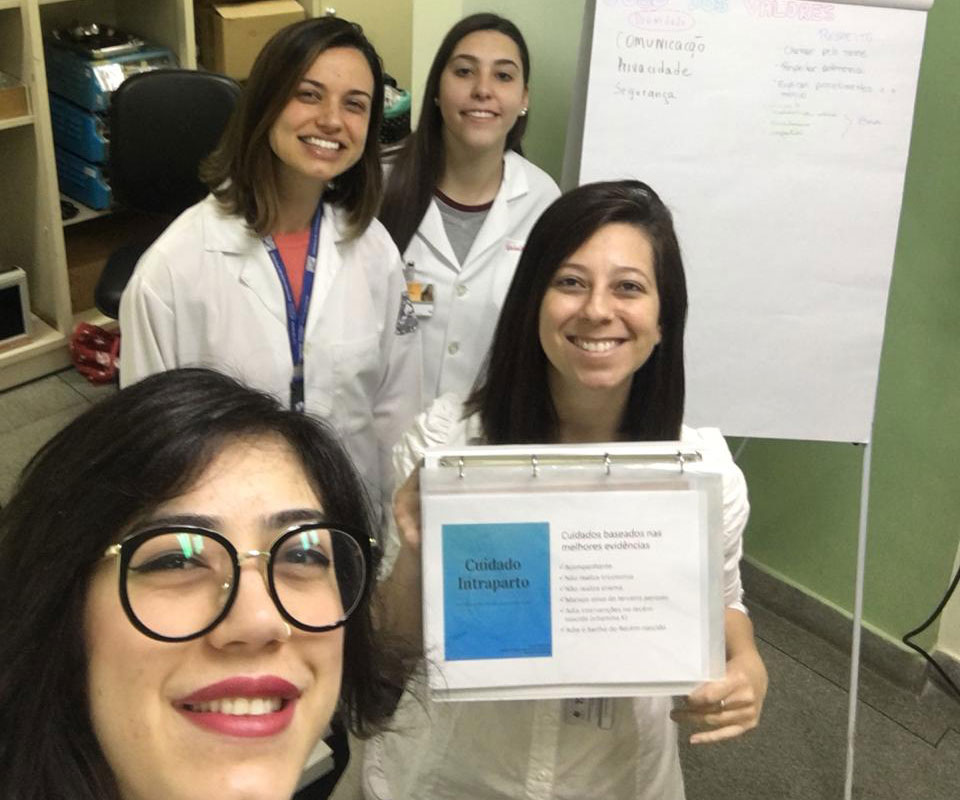Improving mothers’ experience of childbirth through evidence-based intrapartum care

Respectful maternity care is not only a critical component of quality healthcare, it is a human right and a global public health imperative. However, in Brazil, abuse and disrespect in childbirth care is a public health issue. Many studies have documented the prevalence of discriminatory and hostile attitudes in childbirth care, both in the public and the private sectors.
Introduction
Only 5.6% of Brazilian women have normal births without inappropriate and excessive invasive (often not informed about or consented to) interventions during vaginal birth, such as the unregulated use of oxytocin to induce or augment labour, Kristeller manoeuvre, forceps and episiotomy, among others, often leading to poor obstetric outcomes.
According to the World Health Organization, the concept of a ‘normal’ labour and childbirth is not universal or standardised, and there has been a significant increase in the application of a range of labour practices to initiative, accelerate, regulate or monitor the physiological process of labour: "This increasing medicalization of childbirth processes tends to undermine the woman’s own capability to give birth and negatively impacts her childbirth experience."
This environment of routine medical interventions and disregard for women’s autonomy during childbirth has been linked not only to increased physical risks but also to long-lasting psychological trauma.
Background
Luciana Magnoni Reberte Gouveia is a professor in the Department of Maternal-Infant and Psychiatric Nursing, at the University of Sao Paulo School of Nursing. The midwifery and nursing professionals, residents and students at the obstetric centre of a teaching hospital in Sao Paulo, where Luciana taught, were dissatisfied with the care they were providing to women in labour. Complaints included inadvertent or unnecessary use of interventions; a care model centred on medical professionals rather than birthing women; and a lack of autonomy for midwives and nurses.
"When I joined the university, I learned about the evidence-based projects implemented by researchers who participated in the JBI Evidence Implementation Training Program", says Luciana. "The following year I was able to participate in the six-month training program and contribute to improving the model of care for women during childbirth."
Midwives and nurses at the teaching hospital had observed the need to work differently, and to promote respectful and qualified care for mothers during labour, but they needed to know the evidence and how to apply it to make a change in intrapartum care.
Getting research into practice
Luciana focused her six-month evidence-implementation project (as part of the JBI Evidence Implementation Training Program) on improving mothers' experience of childbirth at the hospital. It also meant that, as the hospital was a teaching hospital, the training of the midwives and nurses had to consider and respect the needs of mothers and babies.
"Women must be the protagonist of their own birth experience, and the teaching and learning process should take place in a respectful environment for mothers and babies."
The project followed a structured implementation process: identifying evidence to practice gaps, understanding local barriers, designing and delivering interventions including training and reflective tools, and evaluating impact via a follow-up audit.
One of the first phases of the project was using the JBI Practical Application of Clinical Evidence System (JBI PACES) audit and feedback tool, a baseline clinical audit measured the following 20 evidence-based audit criteria for best-practice intrapartum care:
1. Effective communication
2. Companion of choice
3. Partograph
4. Not offered routine amniotomy or oxytocin
5. Digital vaginal examination
6. Intermittent auscultation of the foetal heart rate
7. Routine perineal/pubic shaving prior to giving vaginal birth
8. No enema
9. Pain relief options
10. Oral fluid and food intake
11. Mobilise and adopt an upright position
12. Follow their own urge to push
13. No manual fundal pressure
14. Active management of third stage
15. Cord clamp
16. Skin-to-skin contact
17. Vitamin K after one hour
18. Delay bathing of the baby
19. Debriefing opportunities
20. Training every year about intrapartum care
The baseline audit was carried out by a research team, with 27 mothers who had normal births accompanied by obstetric nurses.
The audit results showed compliance with the 20 criteria ranged from less than 50% (criteria 6 and 19); less than 75% (criteria 4, 5, 9, 10); less than 100% (criteria 3, 11, 12, 13, 15, 16, 20); and 100% compliance for criteria 2, 7, 8, 14, 17, 18.
Following the JBI Getting Research into Practice (GRiP) approach the team identified the need to conduct in-service training for maintaining accurate nursing records for intrapartum care to reduce unnecessary interventionist practices, and to establish debriefing as a practice.
The team also identified the need to facilitate positive reinforcement of service practices and highlight effective communication and respectful maternal care. They agreed to introduce a Game of Values to enable and strengthen reinforcement of respectful intrapartum care. In addition, the team identified the need for educational pamphlets to promote improved communication channels for women’s feedback on the care they were receiving.
In total, 30 nursing professionals enrolled in the training and three pamphlets on best practices were developed and delivered.

The Game of Values was introduced during training to facilitate exercises in empathy, dialogue and conflict resolution. The Game involved values such as love, generosity, equality, loyalty, joy, respect, balance and dignity, with nurses reflecting on how they practised those values in their daily care. Through the Game of Values, nurses were able to reflect on their beliefs that hindered optimal intrapartum care.

Values were practiced in different situations in caring for women during childbirth. For example, love is practiced through bonding, with pain relief measures, guidance, empathy, showing interest, offering support, being together, caring, patience and attention. Midwives and nurses described the Game of Values as "transformative" and "enlightening", with many reflecting that it was the first time they had really reflected on their values and how they aligned (or didn't align) with the care that was being provided to women. Employing the Game of Values in this way motivated nurses to adopt and implement the evidence-based practices taught in training, leading to significant improvements in intrapartum care at the teaching hospital.
The impact of evidence-driven change
A follow-up audit was conducted after six months after the baseline audit and the implementation of evidence-based care for birthing women. The results demonstrated an improvement in 10 criteria.
Most notably, compliance with women not being offered routine amniotomy or oxytocin (criteria 4) increased by 39%, and women being offered pain relief (criteria 9) increased by 40%.
Compliance with mothers and babies being given skin-to-skin contact (criteria 16) increased by 21%, and the use of the partograph during labour (criteria 3) increased by 20%. Moreover, five of the six criteria that achieved 100% compliance in the baseline audit maintained their score.
"In relation to the lack of acceptance by the medical team for humanising childbirth, in my head I didn't think I was committing obstetric violence, I thought it was helping."
‘The success of this project was an important step in furthering the collaboration and commitment of the health professionals in the obstetric centre to humanise the childbirth experience for mothers and deliver optimal intrapartum care’, says Luciana.
The success of this initiative also aligns with global efforts to achieve the United Nation's Sustainable Development Goals (SDGs), particularly SDG 3 (good health and well-being) and SDG 5 (gender equality), as it addresses inequities in maternal healthcare and promotes the dignity and rights of women in childbirth.
Sustaining evidence-based intrapartum care
Overall, intrapartum care compliance with enhanced care for birthing women that respects their needs has been maintained at more than 75%. The JBI approach to implementation has been an efficient strategy for changing practice, and maintaining enhanced levels of care. It also indicates that midwives and nurses are able to take charge to improve quality of care for women and newborns and challenge existing care models.
The structured, evidence-informed process used in this project, grounded in clinical audits, tailored implementation strategies, reflective practice, and values-based training, can be adapted and replicated in other hospitals and healthcare settings worldwide. Healthcare systems facing similar challenges with over-medicalisation, poor communication, and lack of respectful care could benefit from applying this model to transform childbirth experiences by using evidence and fostering a culture of empathy and dignity.
Challenges for the future include establishing a birthing centre led by nurses and midwives where there is a collaborative exchange environment for health professionals that is led by core human values in delivering quality, evidence-based intrapartum care.
Conclusion
This project demonstrates how a structured, evidence-based implementation approach can transform the culture of childbirth care, even in settings where outdated and harmful practices are deeply entrenched. By empowering nurses and midwives through training, reflection, and tools like the Game of Values, the project fostered respectful, woman-centred care practices that improved outcomes and experiences for mothers and babies. Sustaining this change required both leadership and grassroots engagement, reinforcing the critical role of midwives and nurses in driving systemic reform. The success of this initiative has laid a strong foundation for future ambitions, such as establishing a midwife-led birth centre, anchored in respect, collaboration, and evidence-based care.
Key takeaways
- Respectful, evidence-based childbirth care is a human right. Women deserve to be the central decision-makers in their own birthing experiences, and care must be grounded in dignity, empathy, and evidence.
- Even deeply ingrained, harmful practices can change. Following a structured implementation process, and with the right leadership, reflection, and empowerment, a culture of over-medicalisation and routine intervention was disrupted in favour of woman-centred care.
- Midwives and nurses are powerful agents of change. When equipped with evidence, they can challenge hierarchical models of care and lead system-wide improvements.
Values-based training can bridge the gap between knowledge and practice. The Game of Values proved that experiential learning and values-driven reflection are powerful tools for changing behaviours and attitudes in healthcare.
References
Bohren, M. A., Vogel, J. P., Hunter, E. C., Lutsiv, O., Makh, S. K., Souza, J. P., Aguiar, C., Saraiva Coneglian, F., Diniz, A. L. A., Tunçalp, Ö., Javadi, D., Oladapo, O. T., Khosla, R., Hindin, M. J., & Gülmezoglu, A. M. (2015). The mistreatment of women during childbirth in health facilities globally: A mixed-methods systematic review. PLoS Medicine, 12(6), e1001847.
Diniz SG, Salgado HO, Andrezzo HFA, Carvalho PGC, Carvalho PCA, Aguiar CA, Niy DY. Abuse and disrespect in childbirth care as a public health issue in Brazil: origins, definitions, impacts on maternal health, and proposals for its prevention. J Human Growth Dev. 2015;25(3):377-84.
Leal MsC, Pereira APE, Domingues RMSM, Filha MMT, Dias MAB, Nakamura-Pereira M et al . Obstetric interventions during labor and childbirth in Brazilian low-risk women. Cad. Saúde Pública. 2014;30 (Suppl 1):S17-S32.
United Nations. (2015). Transforming our world: The 2030 Agenda for Sustainable Development (A/RES/70/1).
World Health Organization. (2014). The prevention and elimination of disrespect and abuse during facility-based childbirth. World Health Organization.
World Health Organization. WHO recommendations: iIntrapartum care for a positive childbirth experience
Additional resources
JBI Manual for Evidence Implementation (for GRiP approach)
JBI Practical Application of Clinical Evidence System (JBI PACES)
Disclaimer
Republished with permission from World Evidence-based Healthcare Day
https://worldebhcday.org/stories/story?ebhc_impact_story_id=94
Authors
Luciana Gouveia, Juliana da Silva, Nathalia Bizari and Pamela Nakazone

Luciana Gouveia, Juliana da Silva and Nathalia Bizari